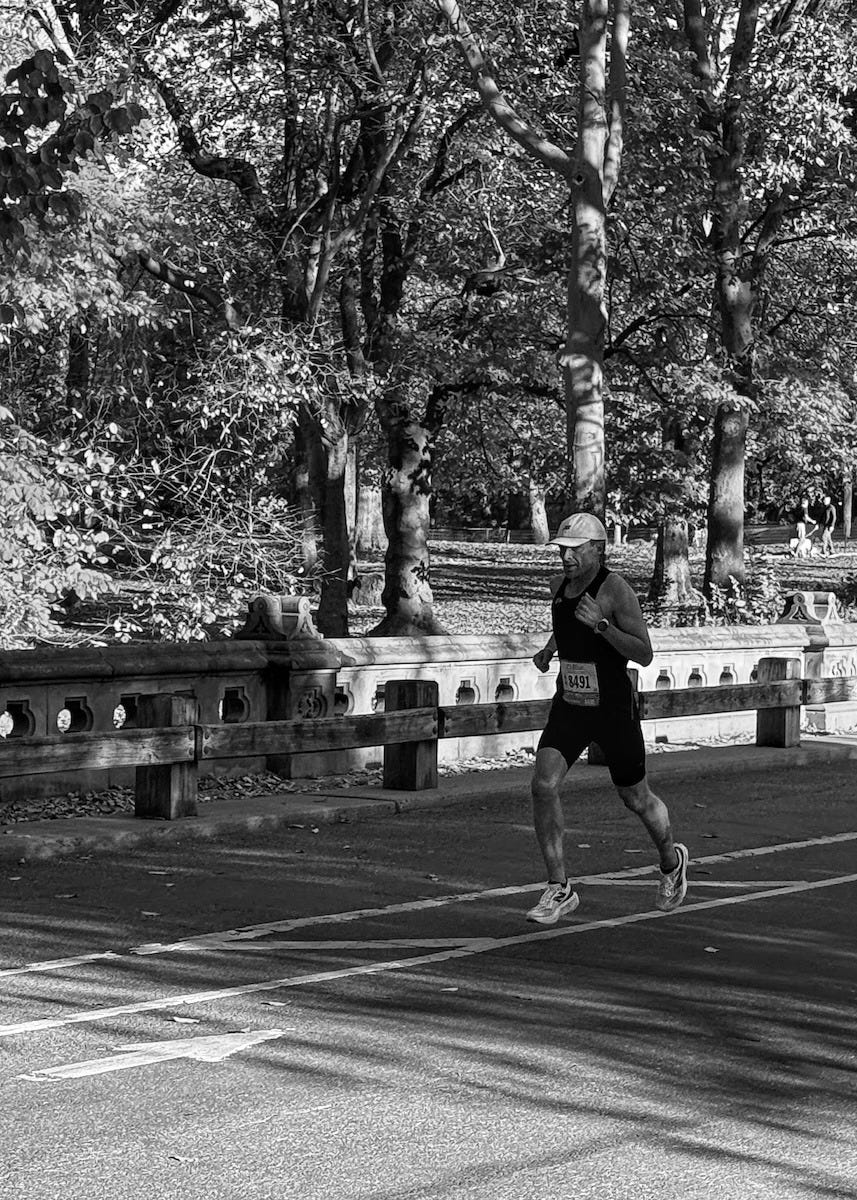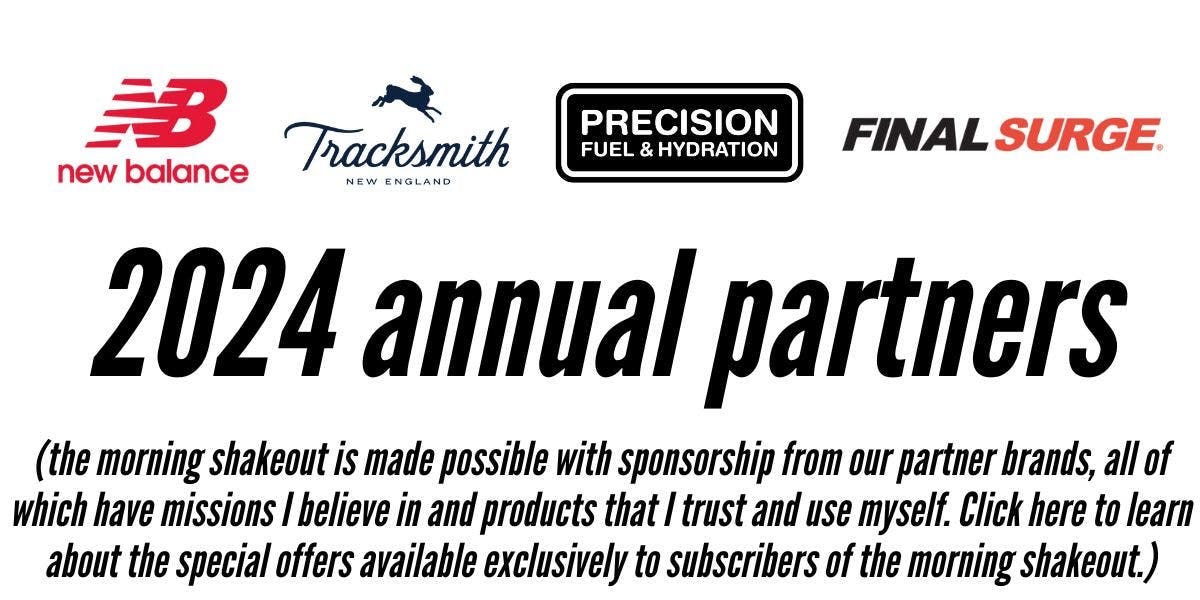the morning shakeout | issue 469
New York, boundaries not balance, Vincent Bouillard on the podcast, and a lot more.

Good morning! I’m on my way home from New York as I type this and most everything I want to say about my experience over the weekend mirrors what I wrote at this time last year, so I’m not going to rehash all of that here. (But please, do read or re-read it.) I’ll just add, or maybe reiterate, rather, that watching the marathon on Sunday was a good and timely reminder heading into what is sure to be a tense week here in the U.S. (and around the world, for that matter), that everyone, for the most part, is just trying to do their best to get through a hard time. Sure, there will always be people who will act selfishly, take shortcuts, or behave in ways that don’t make a whole lot of sense, but by and large we are good and well-intentioned creatures with a capacity for empathy, understanding, and, perhaps most importantly, love. If there’s a lesson from the marathon, it’s that when we can come together in real life to share in a common cause, and help one another keep moving forward despite whatever differences may or may not exist between us, well, we’re capable of some pretty incredible shit. It’s important that we don’t lose sight of that, as runners sharing a race course, yes, but more importantly, as individuals sharing a human experience.
OK, let’s get right to it.
Quick Splits
— As a complement to what I wrote in today’s intro I recommend checking out this article that runner, philosopher, and all-around badass Sabrina Little wrote for Bloomberg, which is adapted from her awesome book, The Examined Run. The short of it is about how running can help us build character and become better people, but the deeper message revolves around actively practicing the virtues we hope to form and live out on and off the roads, trails, and track. She uses the example of putting the middle and high school athletes she coached through a hill workout, where she asked them to set virtue goals alongside training objectives, which was meant to be as much of a moral exercise as a physical one. “For example, ‘Run five repetitions, while practicing courage,’” she writes. “Some other branches of moral philosophy treat human emotion as something to be overcome but Aristotle saw emotions as central to a good life. He believed that moral virtues involved appropriate emotional responses and he defined them as positioned between emotional extremes. Courage, for example, is between excessive and deficient fear. For some runners — the timid ones, afraid of experiencing discomfort — practicing courage meant pressing harder and embracing unease. But for the brash ones — the runners inclined toward recklessness — practicing courage meant a measured approach, starting slower than usual. On my hill, they practiced a fitting response to risk, which moved them closer to virtue.”
— Lee Glandorf, who I had the pleasure of working with when she was director of marketing and communications at Tracksmith, wrote about “Running's Fashion Renaissance” and the brand activation explosion that took place in New York over the weekend and it’s an interesting and worthwhile read. I will tell you that what I’ve half-jokingly referred to as “Pop-Up City” at these major marathons was practically bursting at the seams over the weekend in New York City. Midtown was overrun by brands both big and small, taking over spaces within running distance of the park and hosting all kinds of events from shakeout runs (ahem) and unsanctioned races to panel discussions, live shows, apparel customizations, and the like. It’s all gotten a little out of hand, to be honest. Most of it at this point is who can out-hype everyone else. Anyway, Lee gives a little history lesson of how this fashion renaissance came to be over the past 10 years or so and then does a nice job of rounding up the activations that caught her eye from afar. (I have nothing to add because I didn’t visit any of them even though I was on the ground. If Lee is worried that she’s getting salty, then consider me crusty.)
— I’d never heard the term “happy workaholic” until reading it for the first time last week in my friend Ed Batista’s newsletter, but I found myself identifying with it right away. Here’s a short post Ed wrote about how we happy workaholics need boundaries, not balance, which, through trial and a lot of error over the years, I’ve found to be true for me. What I liked about Ed’s post is how he outlined the different types of boundaries that are important to consider—namely, temporal, physical, and cognitive—so that you don’t let time, your environment, or your own busy brain overwhelm you and out you on a path to burnout. “The concept of life/work balance isn't that helpful for us, because there's always more work to do, we're eager to do it, and we wouldn't have it any other way,” he writes. “In some cases, particularly in junior roles early in our careers, this tendency can be exploited by a dysfunctional culture or an uncaring manager, and at those times we need to protect ourselves to avoid burnout. But as we advance professionally we're less subject to those external forces, and we need to protect ourselves primarily from our own internal drive.”
— I enjoyed and appreciated this reflection from Katie Arnold on remaining “forever young” after recently celebrating her 53rd birthday. “Age isn’t a number, it’s a state of mind: Today is the first day of the rest of your life,” she writes. “And time doesn’t go in one direction, running out, getting smaller as our numbers get bigger. It gets fuller, too, full of all the moments we’ve ever lived, with room for all the ones still to come—moving toward a sum so vast it’s incomprehensible.” As I was reading her post, in particular when she wrote about “aging up,” I was reminded of a line from one of my favorite songs, Simon and Garfunkel’s “The Boxer”: “I am older than I once was, and younger than I’ll be.”
— My favorite album of the year—and it’s not even close—is John Moreland’s Visitor, and the opening track, “The Future is Coming Fast,” has been on repeat the past few days. I can’t find a live version of it but the album version is just John gently fingerpicking on the guitar while singing over it with lyrics that punch you right in the gut. In this one, according to his website, he “captures the personal toll of living inside a perpetual cycle of digital bleakness,” that feels very relatable in this day and age, but, if you listen closely enough, he also makes the case for holding on to optimism when it feels like you’re teetering and everything seems to be burning around you. “I'm praying we can walk the wire,” he sings, “and keep our feet above the fire.”
— From the archives (Issue 312, 3 years ago this week): “If you’ve been using a tiny gym for all your success,” Eliud Kipchoge says in this profile of him written by Cathal Dennehy, “then the day you become successful and go to a huge gym, I don’t think you’ll be better.” This line in particular reminded me of The White Stripes song, “Little Room.” In that tune, which I try to listen to at least once a week, Jack White sings, “Well, you're in your little room, and you're working on something good, but if it's really good, you're gonna need a bigger room. And when you're in the bigger room, you might not know what to do, you might have to think of how you got started sitting in your little room.” The takeaway, I think, is two-fold: 1. Always remember—or remind yourself—where you came from and what got you to where you are. 2. You don’t necessarily need a fancy anything—gym, watch, shoes, office, computer, etc.—to get where you want to go in life. Work with what you’ve got and make the best of it.
— A big thank you to my partners at Tracksmith for supporting my work this month (and throughout 2024). The brand recently launched its Fall Collection and it’s chock full of cozy clothes that are made to keep you comfortable as days get shorter and the temps drop lower. The secret? Merino. Many of the pieces feature Merino wool or a Merino blend to help you regulate temperature. It also doesn’t smell when you sweat in it. The Fells Tights are made from a textured Merino wool blend that will wick moisture while keeping you warm, perfect for those mornings that are borderline freezing while you’re still trying to run fast. Check out the lookbook here and/or shop the collection here. If you buy anything from Tracksmith.com, and you’re doing so for the first time, use the code MarioNEW to save $15 on your order of $75 or more. If you’re already a Tracksmith customer, use the code MarioGIVE and you can get free shipping on your next order (and 5% of your purchase will go to support the Friendly House in Worcester, Massachusetts, an organization that is near and dear to me).
It was a thrill to get back on the mics recently to record a longer form conversation for the podcast. (It had been nearly a year!) My guest for this one is Vincent Bouillard, the surprise winner (to some, anyway!) of the 2024 Ultra-Trail du Mont-Blanc, the most prestigious ultramarathon trail race in the world. The 31-year-old Frenchman, who works in product engineering and innovation at HOKA, broke the tape in 19 hours, 54 minutes, and 23 seconds, the third-fastest time in the 21-year history of the 105-mile race. In this conversation, which was recorded in early October 2024, Bouillard told me what life’s been like since his big victory and what may or may not change for him moving forward. We discussed his life as an athlete and how he’s honed his focus from a young age. He told me about his relationship with his wife, Kamilah Journét (who appeared on this podcast in 2020), why he shifted his focus to ultras a few years ago, how he trained for UTMB, and a lot more. You can listen to this one on your favorite podcast app—make sure you’re subscribed to the morning shakeout—or at this handy link.
(Podcast cover photo courtesy of Marzelle van der Merwe.)
Workout of the Week: The Mona Fartlek
As an athlete, the Mona Fartlek is one of my favorite workouts to do; as a coach, it’s one that I’ll often assign a few times throughout a training cycle. What I love about this session is that it’s efficient and versatile: it can be done anywhere and you can make it as hard or as easy as you need/want it to be (to be fair, the same can be said of most workouts, but I digress). It’s named after Steve Moneghetti, a four-time Olympian in the marathon for Australia, who ran this workout weekly for years (and still does, apparently). The pickups are short and swift and the recoveries in between are more of a steady float than a slow jog (though you manipulate either of those variables to suit your needs depending on your experience level or where you’re at in training). Start to finish, the Mona Fartlek takes 20 minutes to complete. I like to use this workout with athletes who are just getting back into speedwork after some time away from it—the reps are short enough to wrap their heads around—or as a good “get after it” session for my marathoners to break up the monotony of higher mileage and longer workouts. The Mona Fartlek can also serve as a good 20-minute benchmark session every 4-6 weeks by simply comparing your total distance and overall average pace (and heart rate and power, if you’re into those sorts of things) from one attempt to the next. Here are the details.
The bottom line.
“Perfectionism has nothing to do with getting it right. It has nothing to do with fixing things. It has nothing to do with standards. Perfectionism is a refusal to let yourself move ahead….The perfectionist is never satisfied. The perfectionist never says, ‘This is pretty good. I think I’ll just keep going.’ To the perfectionist, there is always room for improvement. The perfectionist calls this humility. In reality, it is egotism. It is pride that makes us want to write a perfect script, paint a perfect painting, perform a perfect audition monologue. Perfectionism is not a quest for the best. It is a pursuit of the worst in ourselves, the part that tells us that nothing we do will ever be good enough—that we should try again. No. We should not.”
—Julia Cameron calling me out in The Artist’s Way (That’s how I felt when I first read it, anyway. I’ve been a recovering perfectionist for years. Sending a weekly newsletter has been helpful in this regard—at some point I just have to hit send and ship it.)
That’s it for Issue 469. If you’d like to support the shakeout, please forward this email to someone who might enjoy it or post the web link in a high traffic area of the internet where others can check it out. (And if you’re seeing this newsletter for the first time and want to receive it for yourself first thing every Tuesday morning, you can subscribe right here.)
Thanks for reading,
Mario







Some absolute gold in here as usual Mario - the "happy workaholic" is awesome